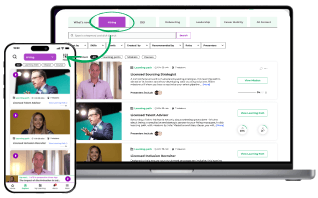Hire top talent with Recruiting training
Hire top talent with Recruiting training
Build a culture of hiring excellence with expert-led training, practice, and feedback on our intuitive platform.
Build a culture of hiring excellence with expert-led training, practice, and feedback on our intuitive platform.

Leading Talent Acquisition teams win with SocialTalent

A learning experience built for recruiters
Unlock speed, quality, and diversity with SocialTalent’s specialized training in inclusive sourcing, candidate experience, employer branding, talent advisory, and more.
Source, screen, and shortlist with confidence

Optimize your sourcing, screening, and shortlisting with strategies that boost response rates by up to 300% and reduce time-to-shortlist by 77%. Our experts will explain how to leverage psychological insights, use AI ethically, and build custom-sourcing playbooks.
Topics include:
Stand out in a competitive market

Boost candidate satisfaction by 15% and elevate your employer brand with inclusive, engaging candidate experiences. We’ll help you to understand candidate motivation, master communication, deliver feedback, and create great onboarding experiences.
Topics include:
Make AI your trusted co-pilot

Leverage generative AI tools to attract top talent, optimize your processes, and save time to become a strategic business partner.
Topics include:
Move beyond the job req

Transform talent acquisition into a strategic partnership that drives business growth. Industry experts John Vlastelica and Stacy Donovan Zapar will enable you to collaborate with hiring managers, drive inclusive hiring practices, enhance sourcing strategies, and make better talent decisions.
Topics include:
Source, screen, and shortlist with confidence
Optimize your sourcing, screening, and shortlisting with strategies that boost response rates by up to 300% and reduce time-to-shortlist by 77%. Our experts will explain how to leverage psychological insights, use AI ethically, and build custom-sourcing playbooks.
Topics include:

Stand out in a competitive market
Boost candidate satisfaction by 15% and elevate your employer brand with inclusive, engaging candidate experiences. We’ll help you to understand candidate motivation, master communication, deliver feedback, and create great onboarding experiences.
Topics include:

Make AI your trusted co-pilot
Leverage generative AI tools to attract top talent, optimize your processes, and save time to become a strategic business partner.
Topics include:

Move beyond the job req
Transform talent acquisition into a strategic partnership that drives business growth. Industry experts John Vlastelica and Stacy Donovan Zapar will enable you to collaborate with hiring managers, drive inclusive hiring practices, enhance sourcing strategies, and make better talent decisions.
Topics include:

Loved by leading TA teams

"Our speed and productivity have increased by a month and we are seeing new sourcers achieving new hires in the first 3 weeks in the team instead of week 6 – 8…[SocialTalent] blew me away with their knowledge."
"SocialTalent is head and shoulders above the competition. Especially in terms of knowing the company, listening, responsiveness, and their ability to change. As relationships go, it’s been exceptional."
"If you spend 5 minutes learning a week, make sure you spend it with SocialTalent."
A learning platform for hiring excellence
Simplify learning for busy teams by merging our library with your custom content on our user-friendly platform.

Let your team build confidence and apply new skills immediately by practicing real-world hiring scenarios with AI-driven activities.
Boost learning with leaderboards, points, badges, certificates, milestone achievements, and interactive discussions.
Upskill your team in a robust environment, with EN ISO 27001:2017 certification, single sign-on, and other advanced security features.
Meet our Recruitment Faculty
Learn from renowned talent acquisition experts who are redefining the industry.

John Vlastelica draws from over 20 years of recruiting experience, including almost 10 years as a corporate recruiting leader. He was the Head of Recruiting for Expedia, Head of Tech Recruiting for Amazon.com, and a hands-on recruiter and engineering recruiting leader for two start-up divisions of McCaw/AT&T Wireless. In 2005, he started Recruiting Toolbox to help other companies improve their in-house recruiting capabilities.
Topics covered:
- Recruiting
- Talent Advisory
- Recruiting Leadership
- Inclusive Hiring

Dr. Joanna Abeyie is an award-winning, agenda-setting diversity champion and recruiter, social campaigner, TV executive, broadcaster, and journalist.
Topics covered:
- Sourcing for Diversity
- Inclusive Hiring

Ed Nathanson has dedicated his career to developing and building high-performing, cost-saving, and internationally recognized hiring and employment branding functions and teams for start-ups, large international enterprise companies, and everywhere in between. He is the founder of RedPill Talent and the VP of Talent and Talent Branding at EQRx.
Topics covered:
- Employer Branding
- Candidate Experience

Salma El-Wardany is a business owner, 2x TEDx speaker, and writer. Her work centers around diversity and inclusion and she fights to change the narrative of marginalized groups. She is the founder of Digitally Human, a marketing business that works with companies to attract diverse talent and build inclusive employer brands.
Topics covered:
- Inclusive Hiring

A 20+ year veteran of the Talent Acquisition industry, Roopesh Panchasra currently leads the Global Executive Talent Acquisition teams for all Uber businesses worldwide. He previously worked in senior leadership positions at companies such as SAP, Workday, Expedia, and VMware.
Topics covered:
- Executive Recruiting

Glen Cathey, with over two decades in recruitment and sourcing, currently serves as the Senior Vice President of Talent Advisory and Digital Strategy at Randstad. Known for his strategic expertise in IT staffing and RPOs, he has built and guided sourcing teams worldwide, advocating for innovation and excellence in recruitment processes.
Topics covered:
- Onboarding
- Re-boarding employees
Frequently asked questions
SocialTalent's Recruitment training library covers a wide range of topics across the recruiting lifecycle. Our seven focus areas include sourcing, screening and shortlisting, candidate experience, talent advisory, talent strategy, industry expertise, and inclusive hiring.
Whether you are a sourcer, recruiter, talent advisor, recruiting leader, or HR business partner, our content is designed to meet your needs.
To get a detailed preview of our Recruitment training content, download our free prospectus
Of course! With SocialTalent, you have access to a range of reporting options to track learner engagement, course completion, milestones, learning badges, certificates, mission progress, content feedback, and popular content.
You can easily get started with our pre-built reporting templates and user-friendly dashboards. Additionally, our platform allows you to create custom reports that focus on the specific metrics that matter to you. Scheduled reports, delivered weekly or monthly to your email, will save time and effort!
Customizing your SocialTalent experience is simple and flexible.
You can create custom learning paths using an existing learning path as a template or build from scratch.
You can also add links to additional content, such as internal documentation, training materials, or resources like blog articles, videos, podcasts, and webinar recordings. This allows you to streamline all your learning materials in one centralized location, making it convenient and efficient for your team.
SocialTalent’s AI-powered activities elevate learning by simulating real-world hiring interactions. These simulations allow learners to practice and refine their hiring skills with real-time feedback. Learners start by gaining insights from our expert faculty, then apply and perfect those skills through AI-driven scenarios that mirror hiring challenges. This hands-on, interactive approach ensures that your team not only understands key concepts but also knows how to apply them effectively, leading to better hiring outcomes and measurable improvements in business performance.
Absolutely! Our learning paths cater to both beginner and experienced recruiters.
With over 50 learning paths available, new recruiters can quickly gain knowledge in foundational areas like sourcing, screening, shortlisting, and inclusive hiring.
For experienced recruiters and TA leaders, our learning paths provide the opportunity to develop skills in talent advisory, leadership, and TA transformation and refresh core skills whenever needed.
Integrations with leading LMS, such as Cornerstone, Degreed, and EDCast, are available to Enterprise customers only as an optional add-on. To explore integrations and associated costs, we recommend scheduling a scoping consultation with our sales team.
For Team and Enterprise customers, we offer the convenience of single sign-on (SSO) without any additional costs.
For more information on platform functionality, see our pricing options.
